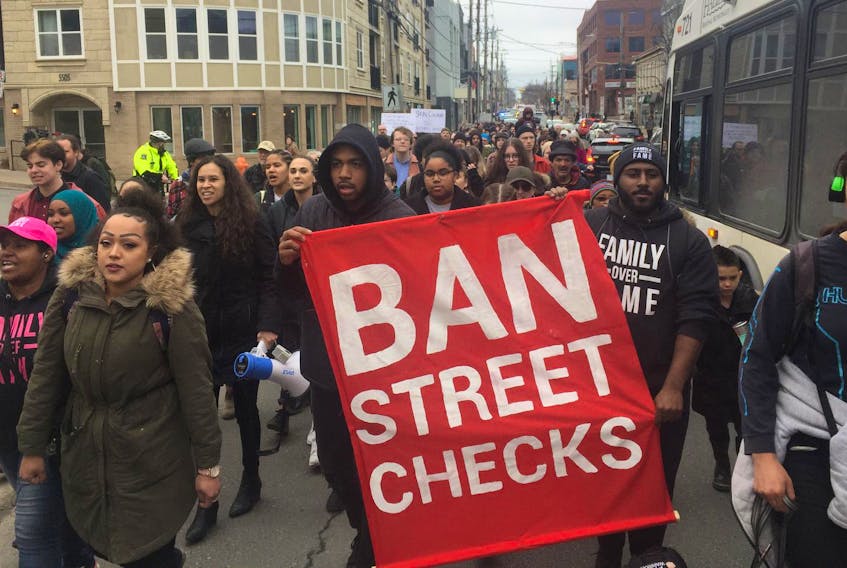The RCMP have acted on a number of Wortley Report recommendations and are actively working on others, says the top Mountie for the Halifax district.
But Chief Supt. Janis Gray said she would not get into specifics about what the RCMP has done in response to the 53 recommendations from Toronto criminologist Scot Wortley in his March report on street checks.
“We are tracking all of the actions that have been done,” Gray said. “A number of the recommendations in the report, the RCMP already had standing policies or training in reference to them so those were quickly addressed and completed. Others that pertain to the RCMP, because there are some that are not our responsibility, are either in progress or we are waiting for feedback from the (provincial) Department of Justice and our partners.”
Street checks have been defined as an interaction or observation whereby personal and/or identifying information is collected by an officer and entered into a database. Concluding that African Nova Scotians were almost six times more likely to be street-checked than whites in Halifax Regional Municipality, Wortley said the practice “contributed to the criminalization of black youth, eroded trust in law enforcement and undermined the perceived legitimacy of the entire criminal justice system.”
Street checks banned
Wortley recommended that street checks be banned outright or strictly regulated. In response, the provincial Justice Department first instituted a moratorium on street checks but later upgraded it to a ban after former Chief Justice Michael MacDonald submitted a legal opinion to the Nova Scotia Human Rights Commission that the practice was illegal.
Halifax Regional Municipality operates under an integrated policing model, with Halifax Regional Police responsible for the urban core, the Sambro Loop and the Purcells Cove-Herring Cove Loop, and the district RCMP policing the remaining, primarily rural, areas.
“There are a number of definitions of street checks,” Gray, who only assumed her position as chief superintendent several months ago, said when asked if RCMP officers in the district had traditionally performed street checks.
“The RCMP has had standing policies in regard to street checks and bias-free policing for several years. Engaging with the community, engaging with persons is part of policing and it’s part of community policing. However, since the moratorium, the RCMP has followed the directive and all engagement with the public has been aligned with the criteria set out by the Nova Scotia Department of Justice.”
Gray said the RCMP recognizes the need to build trust and accountability and is committed to strengthening the force’s relationship with African Nova Scotia communities.
Halifax chief to apologize
Halifax police Chief Dan Kinsella has committed to making a public apology to the black community on Friday at the Halifax Central Library and has a plan going forward for data collected from street checks over the years. Gray said she is not in a position to make decisions on public apologies.
“Our focus is creating a way forward with transparency, addressing all of the recommendations, including important feedback from our African Nova Scotia communities,” Gray said. “Given the scope of the RCMP and being federal in nature, careful consideration for an apology is going to take some time.”
Gray said she couldn’t comment on what direction and/ or timeline Brenda Lucki, commissioner of the national police force, might apply to the apology idea.
Kinsella has said the Halifax police database of street check information is no longer in use and it will be 'de-identified' or scrubbed by December 2020. The police chief said people who think they're in the database can file a freedom of information request to see what kind of information the database contains and he has committed to reviewing past cases involving street checks to determine if there was any criminal wrongdoing.
Gray said the future of the RCMP data accumulated on street checks is one of the recommendations that is still under consideration and a decision is pending.
“Within the province of Nova Scotia, the RCMP has two, what we would call data sets,” she said. “One is in partnership with Halifax Regional Police. As you can imagine, we have consultations as well as working groups in regard with what will be happening with that data.”
Gray said the RCMP will continue to educate officers about the African Nova Scotia community and bias-free policing. She said the force has expanded that training and provides a fiveday Afican Canadian Experience workshop focusing on history, discrimination, human rights and other topics that help in understanding the obstacles and circumstances faced by African Nova Scotian communities.
RELATED:
- Police commission calls for action on Wortley recommendation
- 'Intelligence value:' Checking into street checks in Halifax
- Cape Breton police chief says street checks are not prejudicial
- African Nova Scotian group boycotts Halifax street check meetings
- GAIL LETHBRIDGE: Sorry, but we can’t apologize for street checks
- 'The right thing to do is ban street checks'









